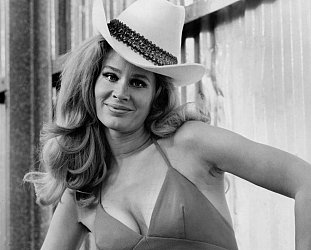Graham Reid | | 7 min read

At one of those flashbulb and tape-recorder after-match functions following this year’s Grammy awards, three-time recipient Bonnie Raitt was the centre of attention.
In a year which gave awards to Natalie Cole and her dead dad singing something written 30 years ago, Bonnie Raitt – just as she was two years back when she picked up four awards - looked like one of the few worthy winners.
Funny, earthy, a magical slide guitar player and someone who can rock out, Raitt had those in the assembled crowd who knew her in fits of laughter with her final quip before she left the press conference.
Well known for her commitment to causes – everything from anti-nuke politics through Farm Aid, Amnesty, Stop Contra Aid and a prime mover in the Rhythm and Blues Foundation – the ever articulate Raitt, concluded on a self-deprecating note: “Now...about that Japanese trade imbalance.”
And down a phone line from Chicago, after outlining the work of the R& B Foundation and how it tries to ensure record companies restructure royalty payments to pay old R&B artists better, she stops herself, laughs long and says: “Hey, don’t get me started...I could go on and on, you know.”
These days Raitt admits she laughs a lot more than she used to. Seven Grammys in two years no doubt helps but putting the bottles and coke away and marrying a year ago were the big ones.
Like her friend John Hiatt, Raitt’s life has come together in the last five years and the music is the better for it. But she is also quick to correct any misconceptions about those loaded, overweight and wasted years in the 80s when her long time record company, Warners dropped her and she became increasingly depressed by the Reagan era.
Yeah, she drank and did it all – but rarely in public. She had too much pride for that.
The press often makes out I was down and out. On the contrary, I made a nice living and always sold records. I never had a hit but I guess I sold more consistently than some of these people who come up and disappear.”
And Raitt, now in her early 40s and a 20-year veteran of the road, can’t disappear herself now even if she wanted to. She’s “the Grammy lady,” and while not wanting to appear ungrateful, she says there is “a teeny downside” to all the attention.
She hasn’t had a vacation for quite a while and has to take advantage of the profile she now has to break into Europe.
“And I don’t like being asked for autographs, I feel my privacy is invaded and there are lunatics out there who follow you when they recognise you. I have to wear a hat in my car now,” says this feisty woman with a cascade of red hair. “In the car! Can you believe that?”
When Raitt tells of the good side of those Grammys, however, it is typically selfless. She gets to take great R&B people on the road and expose her audience to them, pay people what they deserve and raise money for political causes.
“It is frustrating trying to wake people up to issues, but the good thing about having a hit record is when you talk about things and cause trouble, you find more people think like you than you realised.
“But I have the right to express myself because I’m a person first and a musician second. I’d still be expressing my opinion whether I was famous or not. You can’t mouth off about issues if you don’t know what you are talking about. I don’t’ take living in a country where you can speak your mind for granted though. I’m not irresponsible in what I espouse and there are plenty of people who are anti-nuke, for women’s rights and protecting the environment. I’m not alone out here.
“Music is a great thing to do for a living and I enjoy it. But to have the powerbase and the money I now have, then not use that for good causes is not why I’m here. I was raised to think I was here to make things better, not to be a user.”
Born into a Quaker family which almost emigrated to New Zealand in 1964 when the ultra-right wing Barry Goldwater looked set to become president of the United States, Raitt ran headlong into the blues early in life.
Turned on to protest folk by counsellors at a Quaker summer camp, Raitt assimilated the blues from an album recorded at the 1963 Newport festival, started to work the circuit and, through a review of a performance at the Gaslight Club in New York, was offered a contract with Warner Bros Records in 1971.
Her Bonnie Raitt debut included traditional material by Robert Johnson and Sippie Wallace, with guest appearances by Junior Wells and A.C. Reed.
For her interpretations of songs by Jackson Browne, Randy Newman, Joni Mitchell and blues standards over the next two decades. Raitt became the archetypal “musicians’ musician” and the one others wanted to work with. Down the years her albums have had stellar casts which have included Little Feat, B.B. King, Dave Crosby and Taj Mahal.
Even when her public profile wasn’t high, she still commanded the attention of critics and her peers.
In the early 80s she was cracking a tougher sound and by the Nine Lives album of ’86 she was up for her third Grammy nomination for Best Female Rock Performance.
The awards started tumbling in, however of the appropriately entitled Nick of Time, which picked up Album of the Year, Best Female Rock Vocal and Best Female Pop Vocal in 1990. And her duet with John Lee Hooker on his The Healer album the same year snapped up Best Traditional Blues Recording.
Yet Nick of Time had hardly been a huge seller until then. Exactly a year after its release, and in the wake of the Grammy sweep, it rocketed to number one on the Billboard charts.
Her follow-up and current Grammy magnet Luck of the draw has Delbert McClinton, Richard Thompson, Robben Ford, Ivan Neville and others on material by John Hiatt, the Womacks, Paul Brady and more significantly, some awesome Raitt originals which suggest she is poised to emerge as a songwriter over the next few years.
And Raitt – who insists she comes from the Baez/Dylan tradition while others “who want to spend their money on their hair” come from the Connie Francis school – is still the fan.
“Oh God, I just flop around like a fish when I hear that Little Village album [with Ry Cooder and John Hiatt among its members]. I waited for that record like I used to wait for Stones’ or Little Feat albums. And I just toured with John Prine and it was great to sit backstage and hear his songs every night.
“Because I tour all the time and wasn’t a natural songwriter from the beginning – and made an album every summer for six years, then went on the road – I had little opportunity for reflective songwriting. Anyway, there were just so many great songs out there by people like Randy and Jackson, so I never explored my own writing much. But lately I’ve got a lot of satisfaction out of exploring that side of me. But as always it’s a matter of time...”
Quite how Raitt finds the time between touring and the cause she supports is a small miracle.
Even the Grammy awards provided her with a forum she couldn’t’ ignore to advance the cause of the R & B Foundation. This year, as they have previously, members of the foundation hosted an event the day after the awards to draw media attention to the financial plight of some of the original artists whose work provides the bedrock for the music Riatt loves.
“The record business is taking the opportunity to release on new formats things they don’t have to record anew, and the foundation is trying to insist they restructure their royalties. You can’t release all those great Sam and Dave records and not pay them a readjusted royalty rate.
“That’s not fair;...it’s another form of slavery. It’s a goldmine for record companies. Some of these artists never even got paid right in the first place.”
The foundation “invites” the recording industry to “do the right thing” and she note with pleasure that EMI and Atlantic have come around and made sizable donations to the foundation.
“We try to – well, not embarrass the others, but show them we are viable and worthwhile. There would be no rockn’nroll without R&B and this is a way of paying back the people who built this music.”
Yet to focus on Raitt’s high-profile political activities – she helped to organise the MUSE (Musicians for Save Energy) concerts at Madison Square Garden’s in 1979, sang on Sun City and four years ago went to Moscow for the first Soviet/American Peace Concert – is to take away from what she also does.
She didn’t collect Grammys for her Good Works but for those two cracking albums each a unique melange of rock, R&B, a spicing of soul and woven together under Raitt’s spellbinding vocals.
It is a voice and style well road-tested, and live reviews suggest Raitt doesn’t do her job without sweating. Blues and country may well be in there, but the lady has a rock’n’roll heart and a touring band which can cut like a knife.
These are the good days for Raitt, “a walking poster girl for sobriety, she laughs. She tours constantly and even when she has time off she just can’t ignore that benefit concert to help save the environment – so out she goes again.
For a woman who says she had lived with someone since she was 18, and “the first time I was ever single was at 37,” she is now into a marriage that needs constant monitoring, simply because she and her husband, actor Michael O’Keefe, lead such busy, independent professional lives
“Things are going well in music but my personal time to be just Bonnie Raitt is being neglected and I’m suffering because of that. What made me recover from that bad period was getting in touch with the person who is the voice behind all this stuff.
“It’s all well and good to have this success but you need to put a priority on personal serenity and downtime. I need to not be Bonnie Raitt sometimes and am looking forward to having time off the road with Michael.”
So what does she do when she’s not being Bonnie Raitt?
“Just thinking about that makes me grin. I go as far away from the city as I can, take my instruments and somebody I love and just enjoy the quiet.
“I read books, ride my bike, make love, write songs – just the stuff that everyone would like to do. Just thinking about it now...I haven’t been home more than six days in eight months.
“The idea of cooking in my own kitchen is a real treat. I’m not complaining. I picked this life and I love it. But that simple stuff is the best.
“Ahh, but who knows. After a week I’d probably miss the road again!”
This article first appeared in the New Zealand Herald but is not available on the website www.nzherald.co.nz






clive - Mar 5, 2012
yeh,a New Bonnie out later this month
Savepost a comment